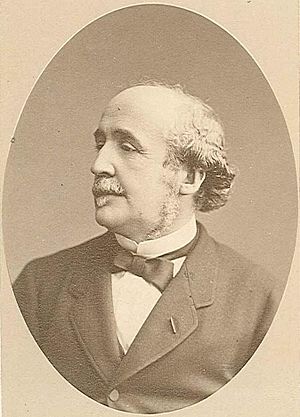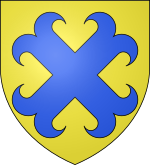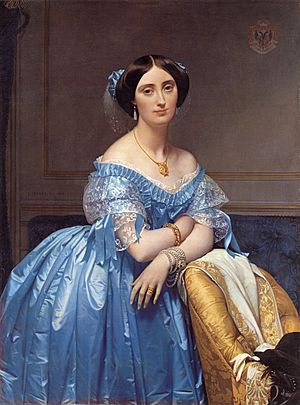Albert, 4th duc de Broglie facts for kids
Quick facts for kids
Albert, duc de Broglie
|
|
|---|---|
 |
|
| Prime Minister of France | |
| In office 17 May 1877 – 23 November 1877 |
|
| President | Patrice de MacMahon |
| Preceded by | Jules Simon |
| Succeeded by | Gaëtan de Rochebouët |
| In office 24 May 1873 – 22 May 1874 |
|
| President | Patrice de MacMahon |
| Preceded by | Jules Dufaure |
| Succeeded by | Ernest Courtot de Cissey |
| Personal details | |
| Born | 13 June 1821 Paris , Seine , Kingdom of France |
| Died | 19 January 1901 (aged 79) Paris , Seine , Third Republic of France |
| Political party | Orléanist |

Jacques-Victor-Albert, 4th duc de Broglie (born June 13, 1821 – died January 19, 1901) was an important French politician, a diplomat, and a writer. He was known for supporting the idea of a monarchy in France.
Broglie served as the Prime Minister of France two times. His first term was from May 1873 to May 1874. His second term was from May to November 1877.
Contents
Biography
Albert de Broglie was born in Paris, France. His father was Victor, 3rd duc de Broglie, who was a liberal statesman. His mother was Albertine, baroness Staël von Holstein. This means he was the great-grandson of Jacques Necker, a famous figure in French history.
After working briefly as a diplomat in Madrid and Rome, Albert de Broglie left public life when the revolution of 1848 happened. He then focused on writing. He had already translated a book by Leibniz in 1846. He quickly became known for his articles in magazines like Revue des deux mondes.
In 1862, he was chosen to join the Académie française, a very respected French council for arts and sciences. His father was already a member. In 1870, he became the 4th duc de Broglie after his father passed away. Before that, he was known as prince de Broglie.
The next year, he was elected to the French National Assembly, which is like the French parliament. Soon after, he became the French Ambassador to London. He later resigned from this role and became a leader in the Assembly. He led a group of royalists who wanted a king, against President Adolphe Thiers.
When Marshal Mac-Mahon became president, Broglie was made Prime Minister and Foreign Minister in May 1873. Later that year, he became the Interior Minister. His conservative ideas were not popular with the Republicans, who wanted a republic without a king. He also struggled to unite the different groups who wanted a monarchy.
Because of these challenges, his government fell in May 1874. Three years later, in May 1877, he was asked to form a new government. His goal was to get more conservative politicians elected. Even though conservatives gained more votes, the Republicans still won a clear majority. De Broglie lost his own election and resigned on November 20.
After being defeated again in 1885, he left politics for good. He went back to his historical writing, publishing many studies and biographies. He passed away in Paris on January 19, 1901, at 79 years old.
Family

On June 18, 1845, Albert de Broglie married Joséphine-Eléonore-Marie-Pauline de Galard de Brassac de Béarn.
They had five children:
- Louis-Alphonse-Victor, 5th duc de Broglie (1846 – 1906). He was the father of famous scientists, including a Nobel Laureate.
- Maurice (1848 – 1862)
- Henri-Amédée (1849 – 1917)
- François-Marie-Albert (1851 – 1939)
- César-Paul-Emmanuel (1854 – 1926)
Honours and titles
 Duke of France (He became the 4th Duke of Broglie in 1870)
Duke of France (He became the 4th Duke of Broglie in 1870) Chevalier, Légion d'honneur (This is a very high French award, received in 1845)
Chevalier, Légion d'honneur (This is a very high French award, received in 1845)
See also
 In Spanish: Albert de Broglie para niños
In Spanish: Albert de Broglie para niños

